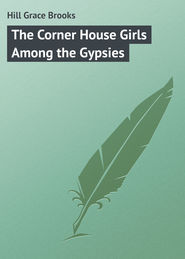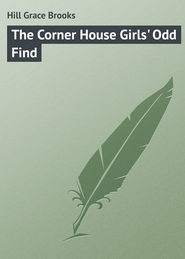По всем вопросам обращайтесь на: info@litportal.ru
(©) 2003-2024.
✖
The Corner House Girls Growing Up
Автор
Год написания книги
2017
Настройки чтения
Размер шрифта
Высота строк
Поля
Yet, there was a whisper in her heart that told Ruth that was not the right way to begin life. If Luke was ambitious he must find a better way. Nor could she help him, it seemed, in the least, for the young man had given her no right to do so.
"Oh, dear me," Ruth finally decided, "it is awfully hard being a girl – sometimes!"
No such questions and doubts troubled Agnes and Neale. Their course through life seemed a smooth road before them. They told each other their aspirations, and everything they planned to do in the future – that glorious future after school should end – had a part for each in it.
Neale O'Neil did not hope to do anything in life which would shut Agnes out; and the girl's thought marched side-by-side with his intentions. Everything hereafter was to be in partnership.
"For you know, Neale, no matter what Ruth says, I really couldn't get along without you."
"Crickey!" exclaimed the boy, "this old world certainly would be what Unc' Rufus calls 'de valley ob tribulation' if you weren't right here with me."
She smiled upon him gloriously, and used that emphatic ejaculation that always horrified Ruth:
"You bet!"
"You're a good pal, Aggie," said the boy, with feeling.
"And since that morning I first saw you and we both tumbled out of the peach tree," Agnes declared solemnly – "do you remember, Neale?"
"I should say I did!"
"Well, I thought you were awfully nice then. Now, I know you are."
So, perhaps Agnes and Neale were growing up, too.
CHAPTER XXIII
THE MAD DOG SCARE
The primary and grammar grades, and the high school, were in beautiful brick buildings side by side at this end of Milton. The little folk had a large play yard, as well as basement recreation rooms for stormy weather. The Parade Ground was not far away, and the municipality of Milton did not ornament the grass plots there with "Keep Off the Grass" signs.
No automobiles were allowed through the street where the schools were at the hours when the children were going to or coming from school. Besides, two big policemen – the very tallest men on the force – were stationed at the crossings on either side to guide the school children through the danger zone.
However, Tess usually waited for Dot after school so that the smallest Corner House girl should not have to walk home alone. It happened one afternoon during these first few weeks of school, while Tess was waiting with some of her classmates for the smaller girls, that Sammy Pinkney, Iky Goronofsky, and half a dozen other boys of Tess' age, came whooping around from the boys' entrance to the school, chasing a small, disreputable dog that ran zigzag along the street, acting very strangely.
"Oh, Tess!" cried Alfredia Blossom, the colored girl, "see those boys chasin' that poor dog. I declar'! ain't they jest the wust – "
"Oh, dear me, Alfredia!" urged Tess, gravely, "do remember what Miss Shipman tells you. 'Worst,' not 'wust.'"
"I'm gwine to save dat dog!" gasped Alfredia, too disturbed by the circumstances to mind Tess' instructions.
She darted out ahead of the boys. Sammy Pinkney yelled at the top of his voice:
"Let that dog alone, 'Fredia Blossom! You want to catch hydrophobia?"
"Wha' dat?" demanded Alfredia, stopping short and her eyes rolling.
"That dog's mad! If he bites you you'll go mad, too," declared Sammy, coming puffing to the spot where the little girls were assembled.
At this startling statement some of the girls screamed and ran back into the yard. There they met the smaller girls coming forth, and for a time there was a hullabaloo that nearly deafened everybody on the block.
Said Sammy with disgust:
"Hoh! if hollerin' did any good, those girls would kill all the mad dogs in the State."
As it was, the police officer at the corner used his club to kill the unfortunate little animal that had caused all the excitement. The S. P. C. A. wagon came and got the poor dead dog, and the doctors at the laboratory examined his brain and sent word to the newspapers that the animal had actually been afflicted with rabies.
It was a strange dog; nobody knew where it had come from. It had bitten several other dogs in his course as far as the school. Some of these dogs were sent to the pound to be watched; but some foolish owners would not hear of sacrificing their pets for the general good. So, within a fortnight there was a veritable epidemic of rabies among the dogs of Milton.
One man lost a valuable horse that was impregnated with the poison from being bitten by the stable dog that had been his best friend.
The order went forth that all dogs should be muzzled and none should be allowed on the street save on a leash. Sammy was very careful to keep Buster chained. Buster had not many friends in the neighborhood at best. So Sammy took no chances with his bulldog.
As for Tom Jonah, the old dog was such a universal pet, and was so kindly of disposition that nobody thought of including him in the general fear of the canine dwellers in Milton.
Tom Jonah was old, and had few teeth left. He was troubled now and then with rheumatism, too; and he seldom left the Corner House yard save to accompany the girls on some expedition. He went with them often in the automobile, especially when they went picnicking on Saturdays. He and Scalawag were very good friends, and sometimes he accompanied the little folks in their afternoon rides around the Parade Ground.
But as soon as the mad-dog scare started the girls were all very careful about letting Tom Jonah go off the premises. He was too old and dignified a dog to run out to bark at passing teams, or to follow strange dogs to make their acquaintance. Therefore the Kenways and Neale O'Neil thought it was not necessary for poor old Tom Jonah to wear an ugly and irritating muzzle all the time. The old fellow hated the thing so!
"I don't blame poor Tom Jonah for not liking to wear that old thing," Dot said thoughtfully. "It's worse than the bit in Scalawag's mouth. And see how Billy Bumps hates to be harnessed up. Supposin'," added the smallest Corner House girl, "we had to put on a harness and have our mouths tied up when we started for school. Oh! wouldn't it be dreadful?"
"I guess it would, Dot Kenway," Tess agreed vigorously. "I guess it isn't so much fun being a dog or a horse or even a goat."
"Huh!" growled Sammy who had become pretty well tired of school by this time; "anyway, they don't have to study," and he looked as though he would willingly change places with almost any of the pets about the old Corner House.
Neale always walked to school with the little folks now, for Ruth was fearful that there might be other dogs loose afflicted with the terrible disease. A panic among little children is so easily started. She could trust Neale to have a watchful care over Dot and Tess.
Nothing so bad as that happened; but there did come a day when tragedy because of the mad-dog scare stalked near to the Corner House.
The dog-catchers were going about town netting all the stray dogs they could find. Foolish people who would not obey the law deserved to lose their pets. And if they wished to, if the dogs were pronounced perfectly healthy at the pound, the owners could appear and claim their pets by paying two dollars.
This last fact, however, was something the little Corner House girls and Sammy Pinkney knew nothing about. They had a horror of "the dog catchers." The collecting agents of the S. P. C. A. are bugbears in most communities. When the children saw the green van, with its screened door in the back, and heard the yapping of the excited dogs within, Dot and Tess stuffed their fingers in their ears and ran.
The children did not understand that stray dogs were likely to be bitten as those other dogs had been by one afflicted with the rabies; and that it was much more humane to catch the unmuzzled animals, that nobody cared for, and dispose of them painlessly, than to have them become diseased and a menace to the neighborhood.
To make the children understand that it was dangerous to play with strange dogs was a difficult matter. The little Corner House girls were prone to be friendly with passing animals.
All hungry and sore-eyed kittens appealed to Tess and Dot; the wag of a dog's tail was sufficient to interest them in its owner; each horse at the curb held a particular interest, too. They were trusting of nature, these little girls, and they trusted everybody and everything.
In coming home from school one afternoon Neale was in a hurry to do an errand, and he left the little folk at the corner, hurrying around to Con Murphy's on the back street, where he lived. Ruth was away from home and Agnes had not yet arrived at the Corner House.
The Willow Street block, however, seemed perfectly safe. Tess and Dot strolled along the block, their feet rustling the carpet of leaves that had now fallen from the trees. Sammy Pinkney was playing solitaire leapfrog over all posts and hydrants.
Just as they reached the corner of the Corner House yard Tom Jonah heard and saw them. He rose up, barking the glad tidings that his little friends were returning from school, and as he felt pretty well this day, he leaped the fence into the street and came cavorting toward them, laughing just as broadly as a dog could laugh.
Even as Tess and Dot greeted him, Sammy Pinkney emitted a shriek of dismay. A big auto-van had turned the corner and rolled smoothly along the block. One man on the front seat who was driving the truck said to his mate:
"There's another of 'em, Bill. Net him."










